
The Animals are an English rock band, formed in Newcastle upon Tyne in the early 1960s. The Animals are known for their deep-voiced frontman Eric Burdon and for their gritty, bluesy sound, exemplified by their signature song and transatlantic number-one hit single "The House of the Rising Sun" as well as by hits such as "We Gotta Get Out of This Place", "It's My Life", "Don't Bring Me Down", "I'm Crying", "See See Rider" and "Don't Let Me Be Misunderstood". They balanced tough, rock-edged pop singles against rhythm-and-blues-oriented album material and were part of the British Invasion of the US.
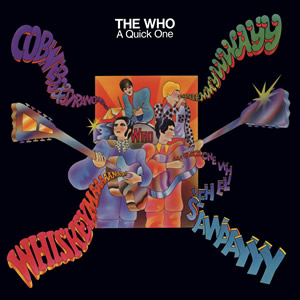
A Quick One is the second studio album by the English rock band the Who, released on 9 December 1966. A version of the album with an altered track listing was released under the name Happy Jack on Decca Records in April 1967 in the United States, where the song "Happy Jack" was a top 40 hit.
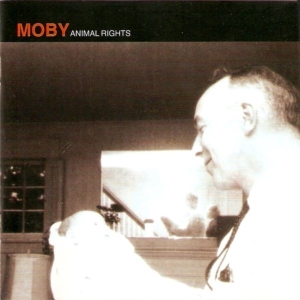
Animal Rights is the fourth studio album by American musician Moby, released on September 23, 1996. The album was a temporary style shift from the electronica music that Moby had previously released to an alternative rock sound influenced by the hardcore punk music that he had enjoyed as a teenager. The album was released to mediocre critical reviews and commercial performance.

The Turn of a Friendly Card is the fifth studio album by the British progressive rock band The Alan Parsons Project, released in 1980 by Arista Records. The title piece, which appears on side 2 of the LP, is a 16-minute suite broken up into five tracks. The Turn of a Friendly Card spawned the hits "Games People Play" and "Time", the latter of which was Eric Woolfson's first lead vocal appearance. An edited version of the title piece combining the opening and ending parts of the suite was also released as a single along with an official video.

"Cigarettes & Alcohol" is a song by English rock band Oasis, written by Noel Gallagher. It was released on 10 October 1994 as the fourth and final single from their debut album Definitely Maybe (1994), and their second to enter the UK top ten in the United Kingdom, peaking at number 7, eventually spending 79 weeks on the charts. On 13 March 2020, nearly 26 years after its release, the song was certified Platinum, indicating 600,000 sales.

No Sleep 'til Hammersmith is the first live album by English rock band Motörhead, released in June 1981 by Bronze Records. It peaked at number one on the UK Albums Chart. It was followed by the release of the single "Motorhead" on 3 July, which peaked on the UK Singles Chart at number 6.

"Where Is the Feeling?" is a song by Australian singer-songwriter Kylie Minogue from her fifth studio album, Kylie Minogue (1994). The song was written by Wilf Smarties and Jayn Hanna, while production was handled by Brothers in Rhythm. It was released on 10 July 1995 as the third and final single from the album, by Deconstruction and Mushroom Records, seven months after the release of the second single. A new version was recorded for the single release, featuring spoken vocals by Minogue.

"Rescue Me" is a song by American singer Madonna from her first greatest hits album, The Immaculate Collection (1990). Written and produced by Madonna and Shep Pettibone, the song was released as the second single from The Immaculate Collection on February 26, 1991, in the United States, and as the third single on April 7 in the United Kingdom. A dance-pop and gospel-house track, the song is accompanied by the sound of thunder and rain, with the lyrics talking of romantic love rescuing the singer.

"I Put a Spell on You" is a 1956 song written and composed by Jalacy "Screamin' Jay" Hawkins, whose own recording of it was selected as one of the Rock and Roll Hall of Fame's 500 Songs that Shaped Rock and Roll. It was also included in Robert Christgau's "Basic Record Library" of 1950s and 1960s recordings—published in Christgau's Record Guide: Rock Albums of the Seventies (1981)—and ranked No. 313 on Rolling Stone magazine's list of The 500 Greatest Songs of All Time. The selection became a classic cult song covered by a variety of artists and was his greatest commercial success, reportedly surpassing a million copies in sales, even though it failed to make the Billboard pop or R&B charts.

The discography of the Animals, an English music group of the 1960s formed in Newcastle upon Tyne, contains 20 studio albums, six compilation albums, five EPs and 25 singles. Featuring a gritty, bluesy sound and a deep-voiced frontman in Eric Burdon, they are best known for their rendition of an American folk song named "House of the Rising Sun", which is described by many as their signature song. This single had worldwide sales of nearly 5 million and became a Number One hit in both the UK and US in 1964. Overall, the group balanced tough, rock-edged pop singles such as "We Gotta Get Out of This Place" and "It's My Life" against rhythm and blues–oriented album material. The Animals released separate UK and US albums, a practice common to other British Invasion bands of the time such as the Beatles and the Rolling Stones.
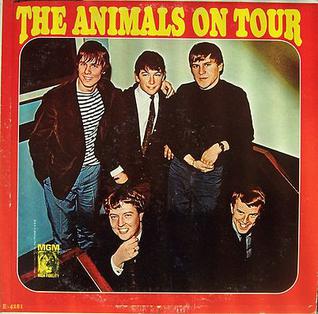
The Animals on Tour is the second American studio album by British rock band The Animals. It was released by MGM Records in February 1965. The album included two previously released singles, "I'm Crying" and "Boom Boom" and is mostly made up of leftovers from the British The Animals album and unreleased tracks intended for the British version of Animal Tracks.

Animal Tracks is the Animals' third album in the United States, released as both LP Record and Reel to reel tape. Musically, it was a hodge-podge of the group's recent hit singles mixed in with tracks of assorted vintage that had not been included on either of The Animals' first two U.S. albums. As such it bore little resemblance in content or purpose to the band's British release also named Animal Tracks from four months earlier. "The Story of Bo Diddley" is an adaptation and expansion of a song recorded by Bo Diddley in 1960, utilizing some of the original lyrics but with additional verses and melody recapping the musician's life in a talking blues style.

"Paying the Price of Love" is the first single from the Bee Gees' 20th studio album, Size Isn't Everything (1993). The song reached the top 10 in Belgium and Portugal and the top 40 in Austria, Germany, the Netherlands, Switzerland, and the United Kingdom. In the United States, it charted on the Billboard Hot 100, reaching number 74, and peaked within the top 30 on the Billboard Adult Contemporary chart. The promotional video for the song shows the brothers performing the song as holograms on a futuristic version of MTV.

"More Than a Woman" is a song by musical group the Bee Gees, written by Barry, Robin, and Maurice Gibb for the soundtrack to the film Saturday Night Fever. It became a regular feature of the group's live sets from 1977 until Maurice Gibb's death in 2003 and was often coupled with "Night Fever".
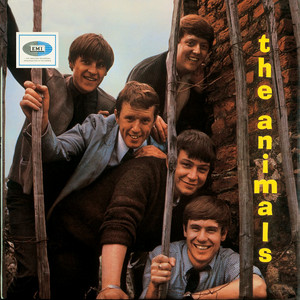
The Animals is the self-titled debut album by the British R&B/blues rock band the Animals. It was released in the United Kingdom in October 1964 on EMI's Columbia Records. The album reached No. 6 in the UK Albums Chart and held that position for 20 weeks.

Flamingo is the debut solo studio album by American singer-songwriter and The Killers lead singer Brandon Flowers. It was released on September 3, 2010, by Island Records. It was recorded at Battle Born Studios in Winchester, Nevada, and Henson Recording Studios in Hollywood, California. The album debuted at number one on the UK Albums Chart.

Electric is the twelfth studio album by English synth-pop duo Pet Shop Boys. It was released on 14 July 2013 on the duo's own label, x2, through Kobalt Label Services. It is the duo's first album since their departure from Parlophone.

The Desired Effect is the second studio album by American singer-songwriter and The Killers frontman Brandon Flowers. It was released on May 15, 2015, by Island Records. It was produced by Ariel Rechtshaid and Flowers and mixed by Alan Moulder. The album debuted at number one on the UK Albums Chart, becoming Flowers' second solo number-one album and sixth overall.

Wallflower is the twelfth studio album by Canadian singer Diana Krall, released on February 3, 2015, by Verve Records. The album was produced by David Foster. The album's supporting tour, Wallflower World Tour, began in Boston on February 25, 2015.
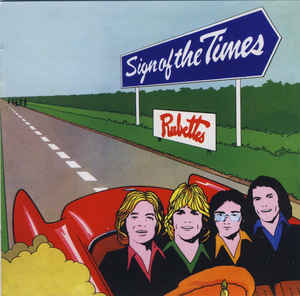
Sign of the Times is the fourth studio album by the English band The Rubettes. It was released on the State Records label in June 1976. The album represented a significant change in direction for the band, as it was the first not produced by Wayne Bickerton and Tony Waddington – instead the Rubettes took on production responsibilities themselves, with Alan Blakley as co-producer. The band made the decision due to the disappointing sales of their previous two Bickerton/Waddington singles and the desire to forge new musical directions.



















